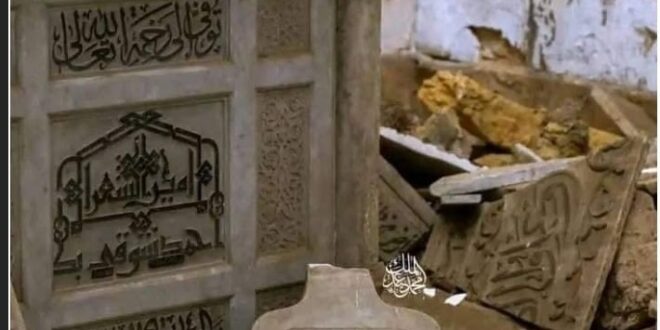Demolishing heritage and cemeteries despite the existence of alternatives
Families’ feelings are respected
Written by Hossam Badrawi
I was pained by my wife’s tears, and her brother’s sadness and anger over the demolition of the cemetery containing the remains of their great father, Hassan Abu Pasha, and his family. I was touched and my heart ached when I learned that more than a hundred deceased members of their families were buried in the cemetery.
I looked around and met families and individuals suffering the same suffering. I searched for the reason for the state’s cruelty and violence in demolition without regard to history, but I did not understand.
I found two articles, one painful and one funny, but laughter stemming from pain, and I saw your participation in them.
The first is Professor Mustafa Obaid, published in Al-Wafd newspaper, in which he says:
The scene hurt us: scattered stones, a thread of dust surrounding the place, a tombstone thrown on the ground, and complete emptiness.
The image is repeated from grave to grave, and from one flag to another, with an accelerating mechanism, reflecting a contemptuous view of the greats who preceded us, who created, produced, and filled the earth with light and development.
What is happening in the tombs of Egyptian symbols deserves more than one pause. The matter is not spontaneous and does not reflect the ignorance of the masters responsible for extending a bridge, or building a new road, of the value of a man like Ahmed Shawqi, Hafez Ibrahim, Muhammad Refaat, Mahmoud Sami Al-Baroudi, Taha Hussein, and others alone.
Therefore, there is an overwhelming feeling of intentional tampering with the tombs of symbols of creativity, thought, and art in imaginary scenarios about an orchestrated conspiracy aimed at erasing Egypt’s modernist leadership in the region. This may not be the case, but what is happening is painful and deserves our consideration.
If the prince of poets, Ahmed Shawqi, had been English, if the poet of the Nile, Hafez Ibrahim, had been French, and if the brilliant reader, Muhammad Rifaat, had been an American, their graves would have been transformed into shrines, their gravestones would have been cared for, their sanctuaries would have been filled with flowers, and their marble slabs would have been washed every day. Loyalty to the greats would be evidence of civilization and proof of beauty. , and motivated to follow suit.
What can be concluded from the crisis is the extinction of the influence of soft cultural power on public issues. A few days ago, my friend, critic and poet Sayed Mahmoud, alerted me that the continued assault on Egypt’s architectural and cultural memory primarily reflects the absence of a conscious intellectual elite such as Youssef Idris, Neamat Ahmed Fouad, Ahmed Bahaa El-Din, and Gamal El-Ghitani, who would not have allowed such tampering.
I definitely disagree with the educated friend. Because the truth is that the educated elite in Egypt is present and alert. The actual problem is the prevalence of indifference and indifference on the part of the government towards intellectuals.
The voices of Ibrahim Abdel Majeed, Ahmed Al-Khamisi, Atef Motamed, Lotus Abdel Karim, Anwar Al-Hawari, Khaled Fahmy, Muhammad Afifi, and others have been heard, and they are pleading with decision-makers not to demolish the tombs of symbols.
This is the dilemma of the fierce attack on Egypt’s cultural heritage. The government views intellectuals as pedantic, quarrelsome “effendis.” Their craft is disagreement, and their wares are words and talk. They do not understand anything in practical reality, and it is the only one who understands, is aware, and does well in action.
Egypt has not executed thinkers, geniuses, geniuses, and honorable opinion-makers who could serve as an alert conscience under the sole banner of the nation’s interest, and the issue of demolishing cemeteries is one of the pressing issues.
The second funny, crying article says:
My friend, who is of Greek origin and nationality, Egyptian birth, nationality, belonging, spirit, and wit, and he is one of the most important tourist guides in Egypt for European tourists, wrote… Sardo wrote this request:
Mr. Professor / Chairman of the Board of Directors of the National Authority for the Removal of Unnecessary Items
After Greetings,,,
As one of the honorable sons of the country, I extend my sincere thanks and congratulations to you for the great work you are doing in removing old buildings that ignorant people call archaeological buildings, which are nothing but strange architectural formations for our time, and I doubt that they were built with permission from the relevant neighborhoods.
I take this opportunity to inform you that there are 3 cemeteries near the Nazlet El-Semman area, occupying a very large area of more than tens of acres, and each of them was dedicated to one person, and even this person did not find his body, and the cemeteries are attributed to strange names: Khufu, Khafre, and Menkaure!! !
Therefore, we ask you to remove these encroachments and use these vast areas to build housing for Egyptians who cannot afford to live, and to create a network of roads and bridges that serve the new area.
I also wish – along with all honorable citizens – to remove this huge, strange idol that you do not know is a man, a lion, or a goat, and we call it the Sphinx. In this vast area – the place of the so-called Sphinx – it is possible to create an open air commercial market, a large chill out center, and several shops for liver, sausage, koshari, shisha, and so on, serving the area. Thus, we will have created a large integrated residential, commercial, and service area instead of its current miserable and illegal situation. .
Please accept any need….
I participated with a group of scholars, politicians, and intellectuals in writing a document that expresses our opinion about what is happening, the content of which is attached to the pictures.
 Dr. Hossam Badrawi Official Website
Dr. Hossam Badrawi Official Website


